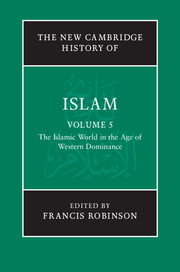Book contents
- Frontmatter
- Introduction
- PART I THE ONSET OF WESTERN DOMINATION C. 1800 TO C. 1919
- PART II INDEPENDENCE AND REVIVAL C. 1919 TO THE PRESENT
- 11 Turkey from the rise of Atatürk
- 12 West Asia from the First World War
- 13 Egypt from 1919
- 14 Sudan from 1919
- 15 North Africa from the First World War
- 16 Saudi Arabia, southern Arabia and the Gulf states from the First World War
- 17 Iran from 1919
- 18 Central Asia and the Caucasus from the First World War
- 19 Afghanistan from 1919
- 20 South Asia from 1919
- 21 South-East Asia from 1910
- 22 Africa south of the Sahara from the First World War
- 23 Islam in China from the First World War
- 24 Islam in the West
- Glossary
- Bibliography
- Index
- References
20 - South Asia from 1919
from PART II - INDEPENDENCE AND REVIVAL C. 1919 TO THE PRESENT
Published online by Cambridge University Press: 28 March 2011
- Frontmatter
- Introduction
- PART I THE ONSET OF WESTERN DOMINATION C. 1800 TO C. 1919
- PART II INDEPENDENCE AND REVIVAL C. 1919 TO THE PRESENT
- 11 Turkey from the rise of Atatürk
- 12 West Asia from the First World War
- 13 Egypt from 1919
- 14 Sudan from 1919
- 15 North Africa from the First World War
- 16 Saudi Arabia, southern Arabia and the Gulf states from the First World War
- 17 Iran from 1919
- 18 Central Asia and the Caucasus from the First World War
- 19 Afghanistan from 1919
- 20 South Asia from 1919
- 21 South-East Asia from 1910
- 22 Africa south of the Sahara from the First World War
- 23 Islam in China from the First World War
- 24 Islam in the West
- Glossary
- Bibliography
- Index
- References
Summary
At the end of the First World War India was in the throes of great political change. In 1919 the Montagu–Chelmsford Reforms, which devolved some powers on Indians in the provinces, and the Rowlatt Act, which restricted Indian civil rights, had changed the legal and political structure of British colonialism. The massacre of Indian civilians at a festival at Jullianwala Bagh by British troops had created a breach between British rule and its Indian subjects. All of these developments served to energise the independence movement. The intellectual and political trajectory of Islam in India after 1919 was shaped in this environment and by Muslim responses to the gradual end of British rule during the inter-war period. Those responses in turn had their roots in intellectual and political developments which had emerged during colonial rule in the nineteenth and early twentieth centuries.
Following the Mutiny Uprising of 1857 Muslims reacted to colonial rule in a number of ways. One of the most celebrated was the modernist project of Sayyid Aḥmad Khān (d. 1898), which sought to reverse the decline of Islam in India by adopting new curricula of education and modern interpretations of the faith that brought many Muslims into the ambit of the colonial order. Reforming Muslim education also influenced ʿulamāʾ in forming new educational formulations such as the Nadwī and Iṣlāḥī traditions centred on Nadwat al-ʿUlamāʾ (Council of ʿulamāʾ) and Madrasat al-Iṣlāḥ (School of reform).
- Type
- Chapter
- Information
- The New Cambridge History of Islam , pp. 558 - 590Publisher: Cambridge University PressPrint publication year: 2010

